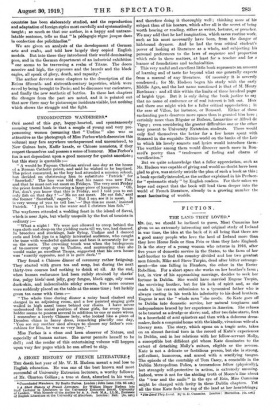FICTION.
THE LAND THEY LOVED.*
M1t. (or, we should be inclined to guess, Miss) Cummins has given us an extremely interesting and original study of Ireland in war time, the idea at the back of it all being that there are a good many people who love the land of Ireland more than they love Home Rule or Sinn Fein or than they hate England. It is the story of a young woman who returns in 1916, after five years of domestic service in the States, to the farm of her half-brother to find the country divided and her two greatest men friends, Mike and Steve Turpin, dead after bitter estrange. ment—the one falling in Flanders, the other in the Easter Rebellion. For a short space she works on her brother's farm ; but, in view of his approaching marriage, decides to seek her fortune in Dublin. She would have married Eugene Turpin, the surviving brother, but for his lack of spirit and, as she reads it, his craven submission to a tyrannical father who is always casting in his teeth his inferiority to his dead brothers. Eugene is not the " whole man " she needs. So Kate goes off to Dublin into domestic service, her natural toughness and independence braced by her experience in America. She refuses to be treated as a drudge or slave; and, after two false starts, first in a household of acid spinsters and then with a dolorous dressmaker, finds a congenial home with the kindly, vivacious wife of a literary man. The story, which opens on a tragic note, takes on an almost farcical turn in the record of Kate's experiences in Dublin, and in her relations with her fellow-servant Molly, a susceptible but diffident girl whom Kate dominates to the extent of detaching Molly's suitors, eligible or the reverse. Kate is not a delicate or fastidious person, but she is strong, self-reliant, humorous, and armed with a scarifying tongue. The episode of the courtship of Tom Casey, a constable in the Dublin Metropolitan Police, a tremendous fellow (physically), but strangely self-protective in action, is extremely amusing. Indeed, were it not for the abiding truth of Moore's line about the " tear and the smile " in the eye of Erin, Miss Cummins might be charged with levity in these. Dublin chapters. Yet all the time Kate feels the tug of the land at her heartstrings ;
in the en() it conquers, and she is able to play her part in reconciling the dead and the living. The book is written without any pronounced political partisanship, though indirectly it is an apologia for Ireland's detachment. For a first novel it shows great promise. Miss Cummins handles the dialect like a true artist, eschewing all devices to reproduce it phonetically, but relying entirely, with admirable results, on the turn of the phrase and the choice of the right word.
READABLE NOVELS.—The Eyes of Understanding. By C. R Milton. (Melrose. 6s. net.)—The story of a girl burdened with a title who takes a post as Superintendent of a Training School in India. Her adventures are interesting, and throw a good deal of light on the present state of things among the native population.—Mufti. By "Sapper." (Hodder and Stoughton. 6s. net.)—A war story chiefly concerned with the doings of the hero after he has been wounded. The description of the bombing of a hospital in France is perhaps the most exciting thing in the book.—Two Months. By Herbert Tremaine. (C. W. Daniel. 7s. net.)—.All the evil effects of the war are gathered together by the author in his story, Two Months. He, however, gives no companion picture of the ennobling effect of the self-sacrifice of the nation. The book is ably written, but none of the characters is particularly sympathetic.



































 Previous page
Previous page